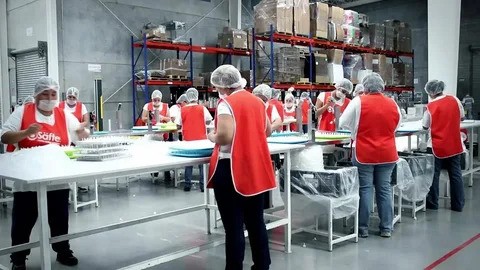Factory Worker Jobs in Canada
Canada’s manufacturing sector is a cornerstone of its economy, providing numerous job opportunities for both domestic and international workers. Factory worker jobs are among the most accessible and in-demand positions, offering stable income, opportunities for skill development, and a pathway to long-term career growth. In this article, we’ll explore the types of factory worker jobs available, average salaries, benefits, and the step-by-step process of finding and applying for these roles in Canada.
Why Choose a Factory Worker Job in Canada?
Factory worker positions are appealing for a variety of reasons, including:
- High Demand:
- Manufacturing is a thriving industry in Canada, with demand for skilled and unskilled labor across sectors such as food production, automotive, electronics, and textiles.
- Diverse Opportunities:
- Factory jobs cater to different skill levels, from entry-level positions to specialized roles requiring technical expertise.
- Competitive Salaries:
- Factory worker salaries are generally competitive and often include overtime pay and benefits.
- Skill Development:
- On-the-job training and opportunities to learn technical skills make these positions ideal for career advancement.
- Accessibility:
- Most factory jobs don’t require advanced education, making them accessible to a wide range of workers, including newcomers to Canada.
Types of Factory Worker Jobs in Canada
The manufacturing sector in Canada offers a wide range of roles. Here are some common positions:
- General Laborer:
- Responsibilities include assembling products, packing, labeling, and maintaining cleanliness in the workspace. These roles require minimal experience.
- Machine Operator:
- Operates machinery and ensures equipment runs smoothly. Basic mechanical skills are often required, and training is typically provided on the job.
- Quality Control Inspector:
- Ensures that products meet quality standards by inspecting items and identifying defects.
- Forklift Operator:
- Responsible for transporting materials within the factory using forklifts. A forklift license is usually required for this role.
- Technician or Mechanic:
- Maintains and repairs factory equipment. These roles require specialized training or certification.
- Warehouse Worker:
- Handles inventory, shipping, and receiving goods. Warehouse workers often work closely with factory operations.
- Food Production Worker:
- Prepares and processes food products in factories. This is a common role in Canada’s thriving food and beverage sector.
Salaries for Factory Workers in Canada
Factory worker salaries vary depending on the role, location, and level of experience. Here’s an overview of average wages:
- General Laborers: $16-$20 per hour
- Machine Operators: $18-$25 per hour
- Quality Control Inspectors: $18-$26 per hour
- Forklift Operators: $18-$24 per hour
- Technicians/Mechanics: $22-$35 per hour
- Warehouse Workers: $16-$22 per hour
- Food Production Workers: $15-$20 per hour
Experienced workers and those in specialized roles often earn higher wages. Additionally, many factories offer overtime pay, shift premiums, and benefits like health insurance and retirement plans.
How to Find a Factory Worker Job in Canada
- Research Job Opportunities:
- Check job boards like Indeed, Glassdoor, Workopolis, and Job Bank Canada for factory worker positions.
- Explore company websites, especially for large manufacturers in your area.
- Network:
- Connect with friends, family, or acquaintances working in the manufacturing sector. Referrals can increase your chances of getting hired.
- Temporary Agencies:
- Many factories hire through staffing agencies. Contact local agencies specializing in manufacturing jobs.
- Social Media:
- Follow companies and job groups on platforms like LinkedIn and Facebook for updates on openings.
- Local Community Resources:
- Immigrant service organizations and employment centers often provide job listings and assistance for newcomers.
Application Process for Factory Jobs
- Prepare Your Resume:
- Highlight relevant skills such as physical stamina, attention to detail, and experience with machinery (if applicable).
- Include certifications like forklift operation or WHMIS (Workplace Hazardous Materials Information System).
- Apply Online or In-Person:
- Submit applications through job boards or company websites. For smaller factories, consider visiting in person with your resume.
- Attend Interviews:
- Be prepared to discuss your work ethic, ability to work in a team, and willingness to learn. Some interviews may include a physical or skills test.
- Complete Required Training:
- If hired, you may need to complete safety training or certifications before starting work.
Skills and Certifications Needed
While many factory jobs don’t require formal education, having specific skills or certifications can make you a more competitive candidate:
- Soft Skills:
- Strong work ethic
- Ability to follow instructions
- Teamwork and communication
- Technical Skills:
- Knowledge of machinery or tools
- Basic computer literacy for roles involving automated systems
- Certifications:
- WHMIS (Workplace Hazardous Materials Information System)
- Forklift license (for forklift operators)
- First Aid and CPR (optional but advantageous)
Challenges of Factory Work
- Physical Demands:
- Many factory jobs require long hours of standing, lifting, and repetitive motions, which can be physically taxing.
- Shift Work:
- Factories often operate 24/7, requiring workers to work night shifts, weekends, or rotating schedules.
- Workplace Hazards:
- While safety measures are in place, factory environments may involve risks such as exposure to machinery, noise, or chemicals.
Immigration Options for Foreign Workers
If you’re an international worker looking to move to Canada for factory jobs, here are some immigration pathways to consider:
- Temporary Foreign Worker Program (TFWP):
- Allows Canadian employers to hire foreign workers to fill labor shortages.
- Provincial Nominee Program (PNP):
- Some provinces prioritize workers in the manufacturing sector.
- Rural and Northern Immigration Pilot (RNIP):
- Focuses on bringing workers to smaller communities.
- Atlantic Immigration Program (AIP):
- Targets workers in Atlantic Canada’s provinces.
- Express Entry:
- Skilled trades and workers with experience in specialized manufacturing roles may qualify.
Tips for Success as a Factory Worker
- Stay Physically Fit:
- Factory jobs often require physical endurance. Regular exercise can help you meet job demands.
- Prioritize Safety:
- Follow safety guidelines, wear protective gear, and report hazards promptly.
- Be Reliable:
- Punctuality and consistency are highly valued in factory settings.
- Seek Opportunities for Growth:
- Take advantage of on-the-job training and certifications to advance to higher-paying roles.
Factory Worker Jobs in Canada
Factory worker jobs in Canada offer stable employment, competitive wages, and opportunities for growth. Whether you’re starting a new career, immigrating to Canada, or looking for a change, the manufacturing sector provides accessible pathways to success. By preparing your resume, acquiring necessary certifications, and leveraging job search resources, you can secure a fulfilling role in this dynamic industry. Take the first step today and explore the countless opportunities waiting for you in Canada’s factories!



